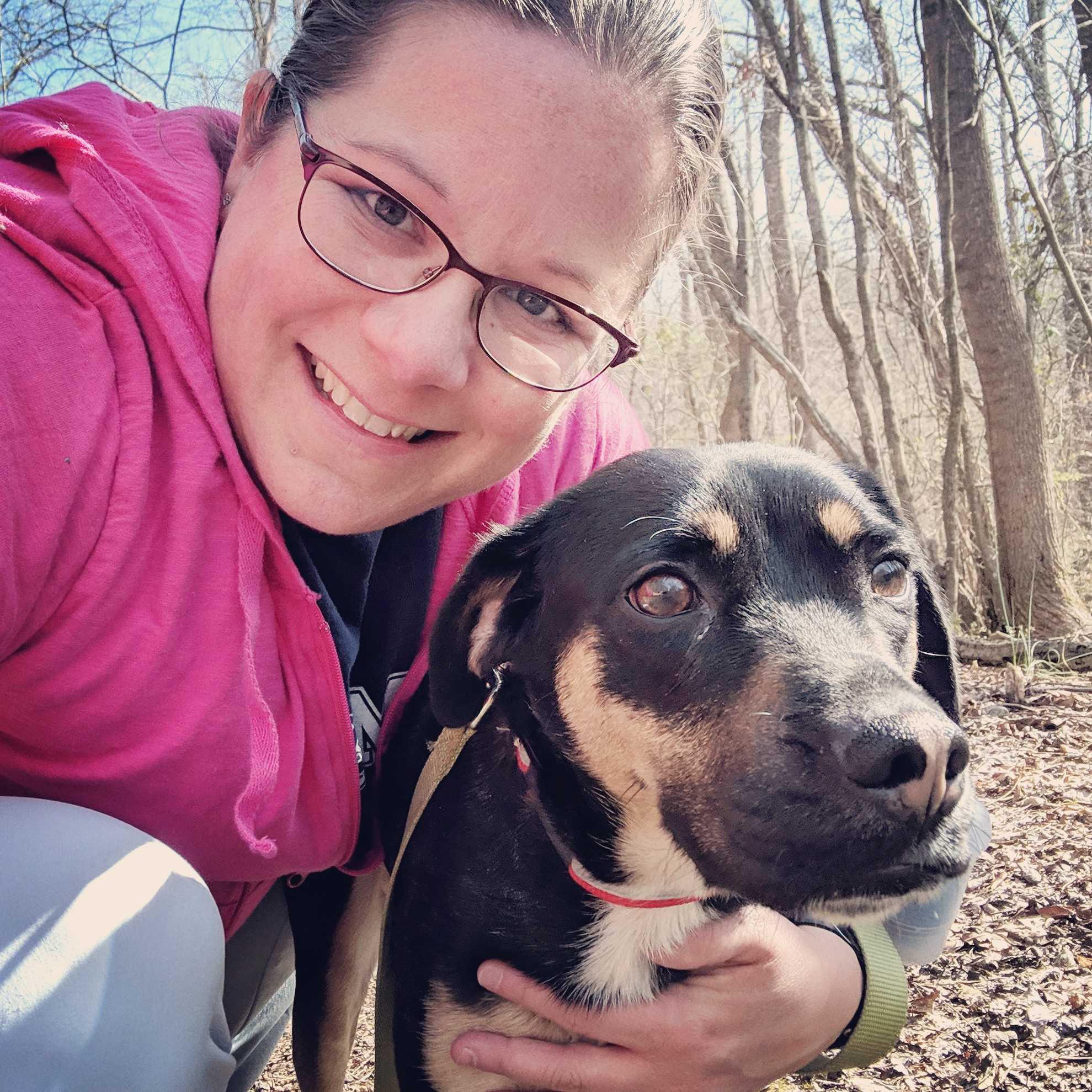How to stop a puppy biting, mouthing or nipping
Although there are many different philosophies on how to stop a puppy biting, some methods are more effective than others
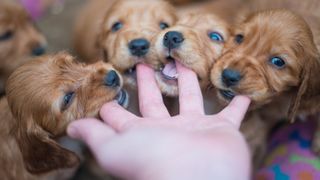
How to stop a puppy biting is something nearly every puppy owner has wondered, at some time or another. Whether they’re calmly chewing on your hands while lying in your lap, or nipping at you during a high-energy play session, biting is a common puppy behavior. While many puppies eventually grow out of biting, there are strategies you can use to speed this process along.
A bit of effort on your part can help save both your skin and your relationship with your puppy!
- Best teething toys for puppies: Soothe your pup's discomfort
- How to discipline a puppy to create a trusting bond
- Best puppy toys: Our perfect picks to keep puppies busy
Why is my puppy biting me aggressively?
Puppy biting has a number of potential causes. In many puppies, this is a normal behavior that will go away with time and consistency. In some cases, however, it may indicate a more significant behavioral concern. The key to addressing this issue is determining its underlying cause.
They're exploring the world
It’s normal for puppies to explore the world with their mouths. When a puppy finds a new toy or object, the first thing they do is take it into their mouth to learn more about it.
Teething
Additionally, young puppies are teething. Just like a teething baby, puppies often chew to alleviate the discomfort associated with new teeth coming in. When your puppy casually chews on your hand, they are likely doing so to gain information or alleviate discomfort associated with teething.
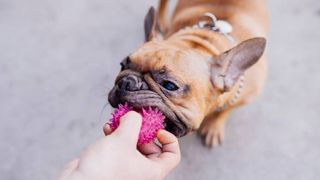
Play biting
Play biting is another common cause of puppy biting. When puppies play with each other, there’s a lot of wrestling and biting. Over time, puppies gradually learn to inhibit their bites, based on the responses they receive from their mother and littermates. Once puppies realize that biting puts an end to playtime, they tend to become less mouthy.
Puppy aggression
Although it’s relatively rare, some types of puppy biting may indicate underlying aggression. If your puppy frequently bites when you pick them up, restrain them, or reach for their food and toys, this could be a red flag. Talk to your veterinarian about these behaviors, in order to determine whether they’re normal puppy behavior or a cause for greater concern.
For more information on this topic, see why is my dog biting?
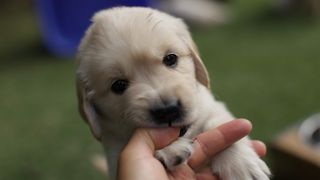
What age does a puppy stop biting? Is puppy biting a phase?
Although there can be significant individual variation, most dogs become less “mouthy” once they reach eight to ten months of age. By this point, they’re no longer teething and they are beginning to adopt more adult behaviors.
It’s still important to avoid the temptation to “wait out” the puppy biting phase. While biting often decreases in frequency as puppies age, that assumes that you are also actively working to discourage your puppy from biting. If you do nothing about your puppy’s biting tendencies, hoping that they will “grow out of it” on their own, you may be disappointed!
How to stop a puppy biting, mouthing or nipping
In some cases, puppies may chew on your hand because they are teething. The easiest way to prevent this behavior is to ensure that you opt for the best puppy toys for your canine companion, including a selection of good quality teething toys.
Here's a few ways to ensure your pup is chewing elsewhere but your clothing, hands and feet:
1. Redirect them to a chew toy
Anytime your puppy begins to chew on your hand, remove it and give your puppy one of their toys. Don’t punish your puppy or make a big deal about it; simply redirect them towards a more appropriate chew toy. In many cases, this is all it takes to minimize biting and chewing.
2. Ignore their behavior
If your puppy tends to bite during play, due to excitement, you’ll need a more intentional approach. Your goal is to teach your puppy that calm behavior results in attention and interaction, while biting earns them the silent treatment. Basically, you want to give your puppy a “time out” as a consequence for biting. Any time you feel your puppy’s teeth make contact with your skin, immediately ignore your puppy for 30 seconds or so.
Stand up or walk away, withdrawing all attention for a brief period of time. Once 30 seconds have elapsed, go back to your puppy and resume playing. Continue to play until you feel teeth on your skin, and then repeat the “time out.”
If everyone in your home is consistent, most puppies learn pretty quickly that keeping their teeth away from skin is the best way to prolong playtime and receive more attention.

3. Encourage non-contact play
When playing with your puppy, encourage non-contact forms of play. Don’t roughhouse or wrestle, because these forms of play encourage a puppy to bite at your hands. Instead, use fetch, tug of war, and other games to promote play in a way that avoids biting.
4. Reward good behavior
Never yell at your puppy or hit them for biting. Some puppies will interpret yelling and hitting as a game, making them even more likely to bite you in the future. Other puppies become fearful in response to punishment, and this could actually increase their biting behavior.
Focus on rewarding appropriate behavior, in order to teach your puppy that they get more play and attention when they do not bite. Learn more about puppy training techniques at how to discipline a puppy.
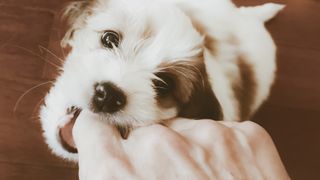
When and where to get further help
If you are struggling with your puppy’s biting, there are numerous resources that you can use for one-on-one help.
Begin by talking to your veterinarian about your concerns. Your veterinarian and their team can address many common behavioral concerns in pets, offering personalized tips based on their observations of your puppy. If necessary, your veterinarian may be able to refer you to an appropriate outside resource such as a trainer or behaviorist.
Pet trainers can be a valuable resource for in-home help. While researching a pet trainer can quickly become overwhelming, limit your focus to trainers that emphasize the use of positive reinforcement.
Run, don’t walk, from any trainer that mentions shock collars, dominance-based training, or other punishment-focused techniques! The Association of Professional Dog Trainers’ Trainer Search site can help you find a dog trainer in your area.
If you are concerned that your puppy is showing serious signs of aggression, ask your veterinarian whether referral to a veterinary behaviorist might be a good option. Although dog trainers can handle most common training concerns, behaviorists are better-prepared to handle aggression, anxiety, and other significant behavioral conditions. Depending on where you live, you may have to travel a long distance to your nearest veterinary behaviorist.
Conclusion
When considering how to stop a puppy biting, remember that this is a normal puppy behavior. If your puppy occasionally chews on your hand and sometimes bites during high-energy play, your puppy is completely normal.
They will likely grow out of this behavior with a little bit of time and consistency. If your puppy is showing more concerning signs of aggression, work with your veterinarian and other professionals to assess the behavior and develop a treatment plan. Addressing your puppy’s biting early is the best way to get this frustrating behavior under control.
PetsRadar Newsletter
Get the best advice, tips and top tech for your beloved Pets
Dr. Barnette is a graduate of the University of Florida, where she received both her B.S. in Zoology and her Doctor of Veterinary Medicine (DVM). She has 15 years of clinical experience as a small animal veterinarian, treating dogs, cats, and occasional exotic patients. She now works as a freelance veterinary writer, creating educational content for veterinarians, veterinary team members, and dedicated pet owners. Dr. Barnette lives in southwest Florida with her husband and daughter (plus two cats, a dog, and a rescued dove!) and enjoys kayaking, biking, and hiking. Learn more about Dr. Barnette at www.linkedin.com/in/catherinebarnette.
